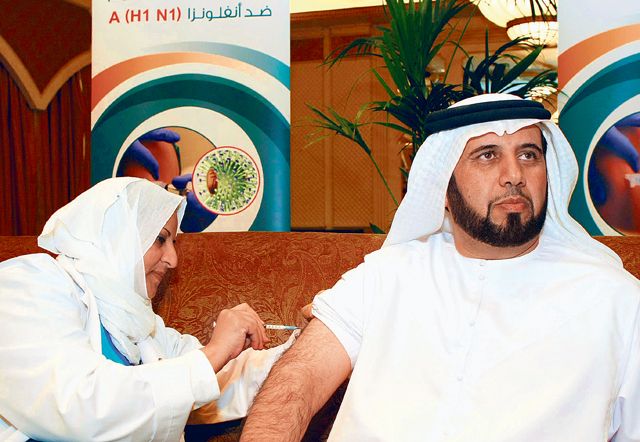Abu Dhabi: UAE Haj pilgrims are required to get three different vaccines before travelling to Makkah; a vaccine for H1N1, another for seasonal influenza and the third for meningitis.
During the second national awareness campaign against H1N1, which is targeted at pilgrims, officials from the Technical Health Committee and the General Authority of Islamic Affairs and Endowments, announced that 6,228 UAE Haj pilgrims would be vaccinated — out of which 5,228 are Emiratis. The vaccinations began on Monday.
Dr Mahmoud Fikri, CEO Health Policies and Head of the H1N1 Technical Health Committee, said that although the vaccine for seasonal influenza is not compulsory unlike the H1N1 and meningitis vaccine, it is advisable, since there will be over two million pilgrims in Makkah this year, which can easily encourage transmission of the flu virus.
Vaccines were available in Abu Dhabi and Dubai from Monday and will be available in the northern emirates from today in a total of 34 preventive health care centres across the UAE.
"The H1N1 vaccine should be taken in one arm, and the seasonal influenza and meningitis vaccine in another arm. Upon taking the vaccine, we will give the pilgrims a medical certificate confirming that they have been safely vaccinated and are ready to travel," said Dr Fikri.
Chief medical officer for the UAE Haj delegation, Dr Abdul Kareem Al Zarouni, told Gulf News on the sidelines of the press conference, that an H1N1 first aid kit will be given to each pilgrim before they travel.
Each kit consists of a mouth mask, hand sanitiser, wipes, disinfectant, painkillers and Vitamin C.
"We have produced 10,000 kits for the UAE Haj pilgrims and have also met with their agencies on two occasions to emphasise hygiene measures once in Makkah," Al Zarouni told Gulf News.
Keeping healthy
The Ministry of Health, the National Emergency and Crisis Management Authority, the General Authority of Islamic Affairs and Endowments, the Health Authority Abu Dhabi and the Dubai Health Authority advise pilgrims of the following steps:
- Carry your first aid kit which contains a hand sanitiser, wet wipes, disinfectants and mouth mask.
- Use your own prayer rug, do not borrow other people's items
- Use your protective mouth mask and regularly change the filter.
- Read the precautionary guidelines issued by health authorities
- Contact the head of the campaign and medical mission if any flu symptoms are detected













